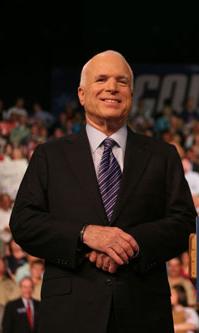Where They Stand: John McCain on Higher Ed
Blog Post
Sept. 2, 2008
Fifteen months after launching his presidential bid, Sen. John McCain (R-AZ) started laying out his higher education policy agenda last month. In a news release, the Senator outlined his policy priorities but provided few details about his proposals.

Simplify the Federal Financial Aid System
McCain believes that many eligible students do not seek out federal financial aid because they find the aid application process too complex and don't understand their options. He would address these concerns by:
- Consolidating Programs: McCain proposes combining various federal grant and loan programs as a means to simplify their administration and help students better understand their eligibility for aid. While he doesn't get into specifics, it's likely that he would follow the Bush administration's lead and take aim at the campus-based student aid programs, which primarily supplement Pell Grants for low-income students. Critics say these programs are not serving the neediest students well because a disproportionate share of the funding is going to students at the wealthiest colleges.
- Streamlining the FAFSA: McCain supports efforts to shorten the Free Application for Federal Student Aid (FAFSA) to make it easier for students to fill out.
- Redesigning Tuition Tax Breaks: The Senator proposes consolidating the various higher education-related tax credits and deductions, including the Clinton administration's HOPE and Lifetime Learning tax credits. "The existing tax benefits are too complicated, and many eligible families don't claim them," McCain says. "By simplifying the existing benefits, I can ensure that a greater number of families have a lower tax burden when they are helping to send their children to college."
"Fix" the Federal Student Loan Program
The Senator calls for creating a "simpler and more effective" federal student loan program but provides little explanation of how to accomplish this goal. Unlike his Democratic opponent, who has called for eliminating the Federal Family Education Loan (FFEL) program and providing loans entirely through the U.S. Department of Education, McCain believes that continued lender participation in the federal loan program is vital. He would, however, "demand the highest standards of integrity" from participating lenders, presumably to prevent a repeat of the pay-for-play student loan scandal that Higher Ed Watch helped expose last year.
Make Higher Education More Transparent for Consumers
McCain believes that the Department of Education can help students make better informed decisions about their college choices by publicly releasing "in a clear and concise manner" reams of data that colleges report to the federal government. The government already collects huge amounts of data from schools but "does nothing with the information." The Senator, however, would not impose any additional reporting requirements on colleges, saying that "the answer" to higher education's problems "is not to impose more regulations." He favors shining a light on information that is already available.
Eliminate Earmarks for Colleges
As part of his campaign against pork-barrel spending, McCain would bar lawmakers from providing Congressional earmarks to colleges for research spending. "Earmarking is destroying the integrity of federally funded research," he says. He would spend a portion of the money saved to increase government spending on university research that is competitively awarded by federal agencies like the National Science Foundation.
McCain's proposals are as notable for what they include as what they leave out. For example, his plan does not call for any new spending on federal student aid. This is in sharp contrast to President Bush, who pledged during his presidential campaigns to significantly boost spending on Pell Grants.
Sen. Barack Obama (D-IL), McCain's Democratic rival, has already criticized McCain for failing to call for expanding student aid. In his speech to the Democratric convention, Obama cited this ommission as evidence that McCain doesn't understand "what's going on in the lives of Americans."
"How else," he asked, could McCain offer "an education plan that would do nothing to help families pay for college?" McCain has not yet responded to this attack, but to be fair, many student-aid experts are skeptical about whether Obama's proposal to significantly expand spending on tuition tax credits is the most effective way to increase college access and affordability.
Stay tuned to Higher Ed Watch in the weeks ahead for more analysis of the presidential candidates' higher education proposals.